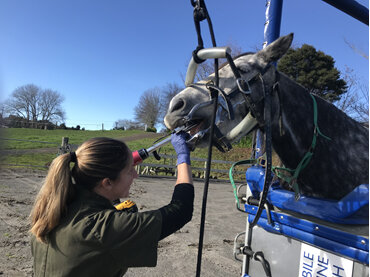Franklin Vets
Franklin Vets - excellence in veterinary care for dairy, farming, lifestyle, equine and household pets. BESTPRACTICE ACCREDITED NZ.

No longer is it all about rasping sharp points, and the benefits of veterinary examination and treatments are becoming clear to spot painful conditions early to not only keep your horse comfortable grazing in the paddock but also during ridden work.
Proactive veterinary dental care can also help reduce the incidence of conditions like colic, low-grade inflammation and weight loss whilst helping your horse utilise all the feed it’s given.
Veterinary dental care has a similar approach to your horse’s teeth as your dentist likely has to your own mouth. It starts with an appreciation of the general health of the animal and an examination of muscles and structures around the head that can indicate whether the horse is chewing normally or not.
After this, a speculum is placed and a dental halter is used to support your horse’s head before the mouth is cleared of debris/feed and the teeth are checked by looking at each one using a light, mirrors and sometimes specialist cameras. In addition to looking at the teeth themselves, we also check the gums, lips and cheeks for signs of trauma from teeth or other abnormalities.
Once the mouth has been checked thoroughly, we can link all the information to work out what problems are significant and which are not.
Often we will find things like sharp teeth are secondary to the reduced use of part of the mouth from a more serious painful condition.
Despite many of these conditions causing much pain within the mouth, many horses show little if any outward signs to their owners and may be eating and riding as normal as well as being in good body condition.
We provide all our horses with sedation for dental procedures and use a specially designed crush to ensure a thorough examination and treatment is provided without compromising patient, vet or owner safety. Many horses resent work around painful areas of the mouth and in addition to sedation, some cases may receive further pain relief such as anti-inflammatories and nerve blocks to help us treat their problems without causing distress.
Our dental vets have undertaken postgraduate training in equine dentistry, including the safe use of specialised equine dental equipment. They are not only fully aware of the complexity of the equine mouth and diseases within it but also have sufficient understanding to safely treat your horse’s mouth. This understanding of anatomy and physiology helps us plan a treatment protocol where dental disease is found as many problems cannot be treated by one float without severely risking painful complications.